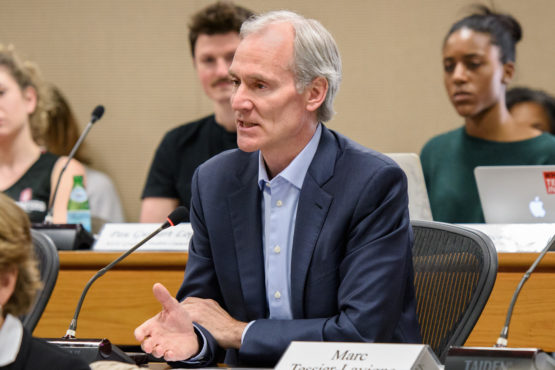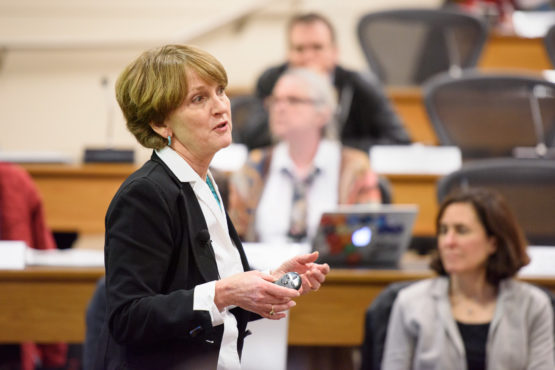Faculty Senate hears reports from President Tessier-Lavigne on campus climate, Stanford Earth dean on status of the school
The speakers at the Feb. 23 meeting included President Marc Tessier-Lavigne and Pamela Matson, dean of the School of Earth, Energy & Environmental Sciences. At the meeting the senate passed a resolution to establish a Residential Programs Faculty Board, and Hans Weiler, academic secretary, encouraged faculty to vote in the election for the 2017-18 senate, which ends at midnight.

At Thursday’s Faculty Senate meeting, President Marc Tessier-Lavigne reiterated that acts of intolerance and acts of hate have no place at Stanford. (Image credit: L.A. Cicero)
President Marc Tessier-Lavigne told the Faculty Senate on Thursday that many communities within Stanford are feeling concerned and vulnerable, and that it was time, once again, to reinforce the university’s support for each and every member of its community.
“That includes our Muslim community, our international community, those who are immigrants or come from immigrant families, our Jewish community, members of the LGBTQ community and several others – too many to mention,” he said. “We are also hearing that some voices on both sides of the political spectrum are feeling marginalized, which goes against the university’s bedrock value of free expression of thought.”
Speaking at the Feb. 23 meeting, Tessier-Lavigne reiterated that acts of intolerance and acts of hate have no place at Stanford.
“In contentious times, reaching out to each other with respect and empathy is critical,” he said. “And seeking to understand and learn from each other, drawing on the strengths of our different perspectives and backgrounds, remains fundamental to the life of the university.”
In other business, the senate heard a presentation from Pamela Matson, dean of the School of Earth, Energy & Environmental Sciences (Stanford Earth), and an update on Title IX efforts from law Professor Pamela Karlan, chair of the Advisory Committee on Sexual Assault Policies and Practices, and Catherine Glaze, Title IX coordinator. The senate also passed a resolution to establish a Residential Programs Faculty Board, and heard a reminder from Hans Weiler, academic secretary to the university, that voting ends at 11:59 p.m. to elect members of the 2017-18 Faculty Senate, and to nominate full professors to fill upcoming vacancies on the Advisory Board.
Stanford Earth
Matson said the School of Earth, Energy & Environmental Sciences has grown dramatically and broadened the scope of its teaching and research over the last 20 years to include topics such as securing the energy future, climate change, food and water security, and natural disaster risk management.

Pam Matson, dean of the School of Earth, Energy & Environmental Sciences, addresses the Faculty Senate. (Image credit: L.A. Cicero)
She said Stanford Earth aims to increase the number of undergraduates majoring in its disciplines, and to reach a significant majority of the student body through courses, field trips and research held around the world, and modules taught at the O’Donohue Family Stanford Educational Farm.
While the number of faculty, staff, graduate students and postdoctoral scholars has increased by 60 percent, the school’s space has only increased 8 percent during that time period.
She said the Mitchell Earth Sciences Building, which was built in the 1960s, is no longer functional for the kind of research or teaching that is done today. Its classroom and lab spaces are antiquated, and there is no room for expansion. Matson said Stanford Earth is raising money and producing a conceptual design for a new building.
Matson said research funding represents another challenge for Stanford Earth.
“In our areas – and in the National Science Foundation, the Department of Energy, the Environmental Protection Agency and NASA – research funding has been flat for a long time, and more and more people are applying for grants,” she said. “So, our faculty have to work a lot harder to get grants funded. Our affiliates programs are also in somewhat of a decline, so we’re facing reductions in research funding right now.”
She said Stanford Earth is thinking very carefully about how to use its own resources to sustain faculty research.
Residential Programs Faculty Board
At the meeting, the senate approved a motion to establish a Residential Programs Faculty Board, which “will be responsible for maintaining the highest standards of liberal education across the entire undergraduate residential system.”
The board, which will provide broad support and oversight for residence-based programs, will have 13 members, including at least seven faculty members, at least two students and at least two staff members. Two or more members should be current or former resident fellows.
Among its responsibilities: Develop, support, monitor and advocate on behalf of residence-based programs; establish clear criteria and procedures to enable interested students, faculty and staff to design and launch new residential initiatives; and work to revive or reconfigure struggling programs and replace programs that no longer serve student needs.
The full minutes of the Feb. 23 meeting will be posted on the Faculty Senate website. The next senate meeting is scheduled for March 9.
